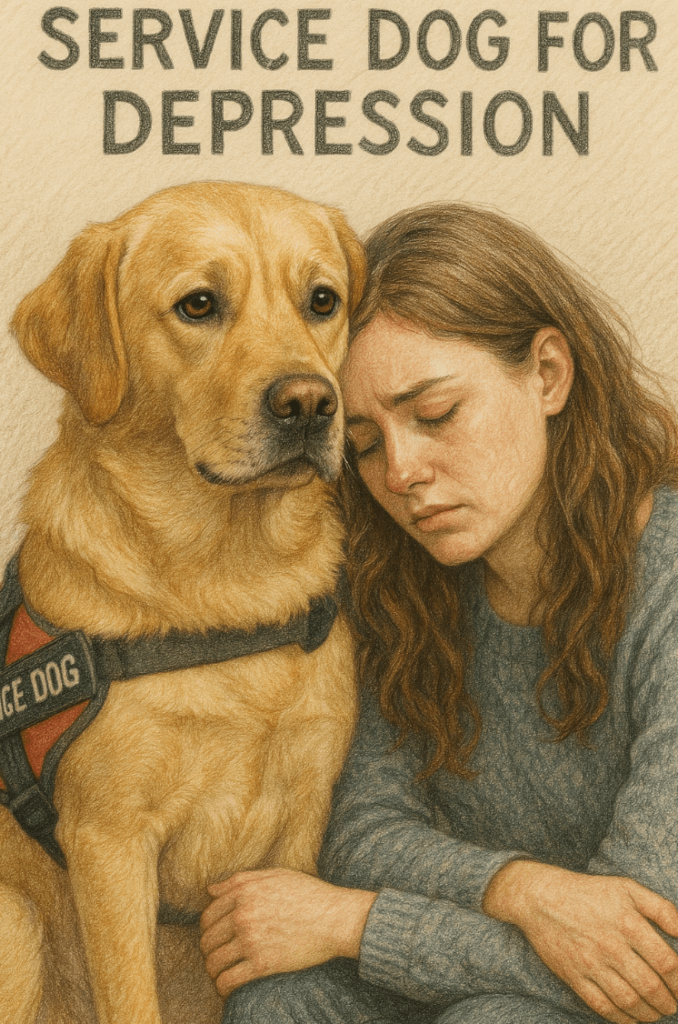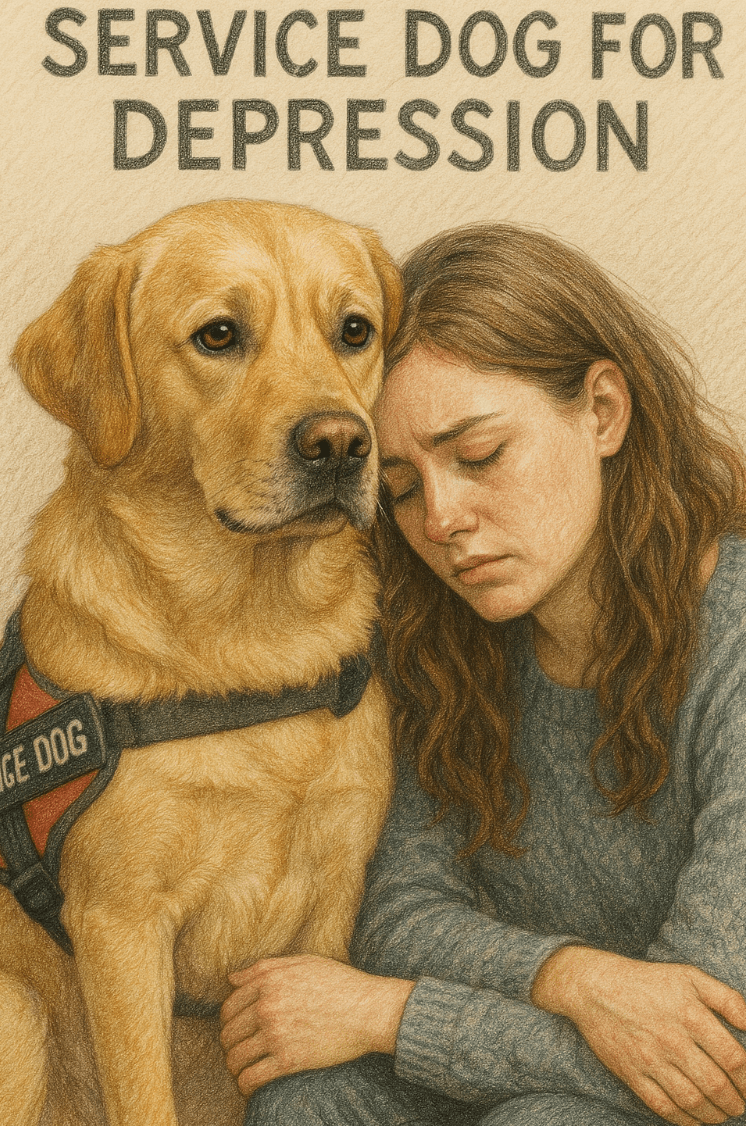Service Dog for Depression: A Lifeline for Mental Health
Depression is a complex and deeply personal struggle that affects millions of people worldwide. For many, traditional treatments like therapy and medication provide relief, but others seek additional support to manage their symptoms effectively. Enter service dogs for depression—a unique and powerful tool in the journey toward mental wellness. These specially trained companions offer not only emotional comfort but also practical assistance tailored to the needs of individuals living with depression.
In this blog post, we’ll explore how service dogs can transform lives, the tasks they perform, and what it takes to bring one into your life. Whether you’re considering a service dog or simply curious about their role, this guide will provide valuable insights into this remarkable partnership.
How Service Dogs Help with Depression
Service dogs for depression are more than just pets—they are trained professionals capable of performing specific tasks to alleviate symptoms and improve daily functioning. Here’s how they make a difference:
Providing Emotional Support:
Their calming presence helps reduce feelings of loneliness and anxiety, offering unconditional love and companionship.Interrupting Negative Behaviors:
They can recognize signs of emotional distress, such as crying or pacing, and intervene by nudging or licking to redirect focus.Encouraging Routine and Responsibility:
Caring for a service dog fosters structure, which can be particularly helpful for individuals struggling with motivation during depressive episodes.Assisting with Physical Tasks:
From retrieving medications to reminding owners to take prescribed pills, they provide tangible help that supports mental health care.Grounding During Panic Attacks:
Through deep pressure therapy (DPT), they apply gentle weight to the owner’s body, helping them feel grounded and calm during overwhelming moments.
The multifaceted support provided by service dogs makes them invaluable allies in managing depression and enhancing overall quality of life.
Qualities of a Good Service Dog for Depression
Not all dogs are suited to become service animals for depression. Certain traits ensure they excel in this demanding yet rewarding role.
Temperament:
Ideal candidates are calm, patient, and highly trainable, able to remain composed in various environments.Intelligence:
Quick learners with problem-solving skills are essential for mastering complex tasks related to mental health support.Empathy and Sensitivity:
The ability to sense changes in their handler’s mood or behavior is crucial for timely interventions.Physical Stamina:
Service dogs must have the energy to work long hours without becoming fatigued or distracted.Adaptability:
Comfortable in diverse settings—from crowded public spaces to quiet homes—they should adjust seamlessly to different situations.
Selecting a dog with these qualities sets the foundation for a successful partnership built on trust and mutual understanding.
Check this guide 👉Autism Service Dog Tasks: Best 7 Expert Tips!
Check this guide 👉Therapy Dog vs Service Dog: Best 7 Expert Tips!
Check this guide 👉How to Get a Service Dog for Epilepsy: Best 7 Expert Tips!

Benefits of Having a Service Dog for Depression | Challenges to Consider |
|---|---|
Provides constant emotional support | Requires significant time and financial investment |
Helps establish healthy routines | Public access laws may vary by location |
Reduces feelings of isolation | Training process can be lengthy and intensive |
Offers physical assistance | Not suitable for everyone; individual compatibility matters |
Enhances social interactions | Potential allergies or housing restrictions |
Tasks Performed by Service Dogs for Depression
Service dogs undergo rigorous training to perform specific tasks that directly address the challenges faced by individuals with depression.
Medication Reminders:
They nudge their handlers at designated times to ensure medications are taken consistently.Deep Pressure Therapy (DPT):
By applying gentle pressure, often by lying across the handler’s lap or chest, they provide soothing relief during panic attacks.Interrupting Self-Harm Behaviors:
If a handler exhibits harmful behaviors, such as scratching or hitting themselves, the dog intervenes by blocking or distracting them.Retrieving Essential Items:
They fetch items like water bottles, phones, or blankets, enabling independence during difficult periods.Alerting to Rising Anxiety Levels:
Sensitive to subtle cues, they alert handlers before symptoms escalate, allowing proactive self-care measures.
These specialized tasks demonstrate the profound impact service dogs can have on managing depression effectively.
Steps to Acquire a Service Dog for Depression
Bringing a service dog into your life involves careful planning and preparation. Follow these steps to ensure a smooth transition:
Consult Your Healthcare Provider:
Discuss whether a service dog aligns with your treatment plan and obtain necessary documentation.Research Reputable Organizations:
Look for accredited programs specializing in psychiatric service dogs, ensuring high standards of training and ethics.Evaluate Costs and Funding Options:
Understand the financial commitment involved and explore grants or fundraising opportunities if needed.Undergo Compatibility Testing:
Many organizations require evaluations to match you with a dog whose temperament suits your needs.Commit to Ongoing Training:
Even after placement, continued training strengthens the bond and ensures the dog remains effective in its role.
Taking these steps ensures you find the right service dog and build a strong, supportive partnership.
Misconceptions About Service Dogs for Depression
Despite growing awareness, misconceptions about service dogs persist. Addressing these myths promotes greater understanding and acceptance.
They Are Just Pets:
Unlike emotional support animals, service dogs undergo extensive task-specific training to assist with disabilities.Only Visible Disabilities Qualify:
Psychiatric conditions like depression qualify under disability laws, granting equal rights to service dog handlers.Training Is Simple and Quick:
Proper training takes months or even years, requiring patience and expertise to ensure effectiveness.Service Dogs Work Nonstop Without Breaks:
Like humans, they need rest, playtime, and regular veterinary care to maintain peak performance.Anyone Can Fake Having a Service Dog:
Misrepresentation undermines legitimate handlers; proper documentation and adherence to legal guidelines are critical.
Clarifying these misconceptions fosters respect for the vital roles service dogs play in mental health care.
Ways to Support Someone with a Service Dog for Depression
If someone in your life has a service dog for depression, there are thoughtful ways to show your support while respecting boundaries.
Respect Privacy:
Avoid asking intrusive questions about their condition or the dog’s role unless they volunteer information.Acknowledge the Dog’s Job:
Refrain from petting or distracting the dog without permission, as they are working to support their handler.Offer Practical Help:
Assist with errands or chores if the handler seems overwhelmed, easing their daily burden.Educate Others:
Advocate for the handler’s rights in public spaces by correcting misinformation about service dogs.Be Patient and Understanding:
Recognize that bad days happen, and offer empathy rather than judgment during challenging times.
Supportive actions create an inclusive environment where both handler and dog feel valued and respected.
Self-Care Tips for Handlers with Service Dogs
Owning a service dog is a rewarding experience, but it also comes with unique challenges. Practicing self-care ensures you maintain a healthy balance.
Prioritize Personal Time:
Schedule moments away from the dog for hobbies or relaxation to prevent burnout.Stay Physically Active:
Regular walks benefit both you and your dog, promoting fitness and bonding.Seek Community Support:
Connect with other service dog handlers through online forums or local groups for shared experiences and advice.Monitor Your Mental Health:
Keep track of your emotional well-being and consult professionals if new challenges arise.Celebrate Small Wins:
Acknowledge milestones in your journey together, reinforcing positivity and gratitude.
By prioritizing your own needs alongside those of your service dog, you create a harmonious partnership that thrives over time.
Frequently Asked Questions About Service Dogs for Depression
Can any dog become a service dog for depression?
No, only dogs with the right temperament, intelligence, and trainability qualify for this role.
Do I need certification for my service dog?
While certification isn’t federally required in many countries, having proper credentials simplifies public access rights.
How much does it cost to get a service dog?
Costs range from $10,000 to $50,000 depending on the organization and level of training provided.
Are service dogs allowed everywhere?
Yes, under laws like the Americans with Disabilities Act (ADA), service dogs can accompany handlers in most public spaces.
What happens if my service dog retires?
Retired dogs typically transition to pet life, either staying with their handler or being rehomed with family/friends.
Transforming Lives Through the Power of Service Dogs for Depression
A service dog for depression represents far more than a furry companion—it embodies hope, resilience, and unwavering support. By providing emotional comfort, performing vital tasks, and fostering a sense of purpose, these incredible animals empower individuals to reclaim their lives from the grips of depression. However, owning a service dog requires dedication, resources, and a willingness to embrace the responsibilities that come with such a transformative partnership. If you’re ready to embark on this journey, know that the rewards are immeasurable, offering not just relief but renewed strength and joy. With the right preparation and mindset, a service dog can become your ultimate ally in overcoming depression and thriving once again.
Do Cats Have Taste Buds? Best 7 Expert Tips! – Discover how cats experience flavors and why their taste is so unique.
Do Dogs Have Taste Buds? Best 7 Expert Tips! – Discover how dogs experience taste, their preferences, and what it means for their diet and health.
Can Cats Taste Sweet? Best 7 Expert Tips! – Discover why cats can’t taste sweetness, how it affects their diet, and tips to keep them healthy and happy.
Can Dogs Taste Sweet? Best 7 Expert Tips! – Discover how dogs perceive sweetness, which foods are safe, and tips to manage their sweet cravings responsibly.





